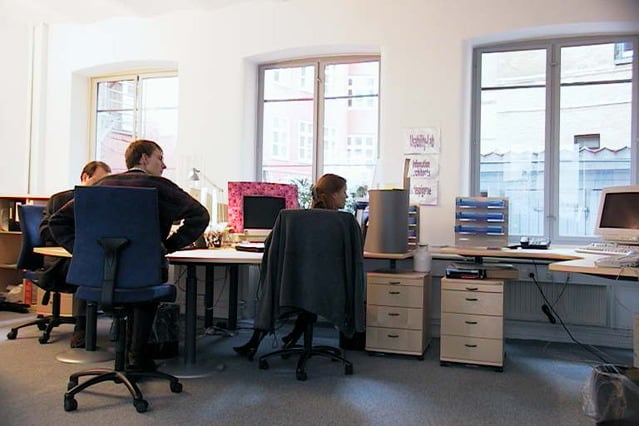In business, location can mean everything. Though we live in a world where an increasing number of business and economic transactions take place in a virtual space, physical factors such as location still make an important difference to enterprises starting out or trying to scale and take business to the next level. As with making plans and strategies that can lead to growth, choosing the best possible location can open up opportunities that would otherwise be overlooked.

For businesses already established, various factors can lead to a business relocation. As it’s not usually as simple as it seems, IT relocation services to manage your business move will most likely be a sensible decision.
With a higher number of data-driven tech industries, more startups are completely footloose and not limited to any specific location, as was the case in the past. This means they have more freedom in choosing where to operate business, although new considerations on determining where a business model can be the most effective and successful will begin to be taken into account.
Staffing
To a greater or lesser extent, business location is determined by the available talent in any city or area. Skilled IT professionals are more concentrated in certain parts of the world, with wide talent pools in cities like Seattle and a tech talent shortage in Sweden. This means many tech businesses may be forced to follow available employees rather than the other way around. A company that can’t be adequately staffed may affect future success.
Additionally, this may relate to unskilled employees, so locating to a remote area should be avoided. Transportation for new and existing employees should also be a consideration in choosing an office site, as well as local amenities for employees that are asked to relocate.
Rental costs
Office rental costs can certainly vary from one location to the next. While in London flexible space can cost from £650 to £1500 per person per month, in Liverpool the same index is between £150 and £300.
Cities like Tokyo, New York and Hong Kong have the highest office rental rates, over £260 per metre per year. Compared with Manila, where office rental rates are an average £185 per metre per year, rental rates clearly make a considerable difference in the budget of a startup.
For startups that are anticipating a period of rapid growth, offices that can accommodate expansion may be another deciding factor. Many startups prefer the option of renting space that’s flexible enough to allow for changes, whereby companies can rent space on a monthly basis. Others choose to work from coworking spaces, such as WeWork, where rental rates vary in different parts of the world. While a month of coworking in Berlin may cost an average of $285, in Chiang Mai it will come to just $105.
Quality of living
For executives and employees alike, quality of living can be a key factor in deciding where to live or relocate. Overcrowded cities that are oppressive as well as expensive are becoming less attractive to a growing number of people. Startups mainly staffed by younger employees often choose to base themselves in an exotic location where life outside of work can be more adventurous and enjoyable.
For more settled or traditional companies, lifestyle aspects are important, as a warm climate, excellent cuisine, and access to healthcare and leisure activities will have an important influence on career and business decisions.
Funding and initiatives
Funding can make a significant difference to startups deciding on a location, as investment may be limited to certain geographical locations. While it’s possible to source funding from a distance, investors often prefer to be close to their vested interests.
The availability of venture capital can vary widely from city to city. In London, venture capital funding has reached over £5 billion since 2016, which is much higher than any other European city. As the world’s largest startup centre, San Francisco startups raised $26 billion in 2017.
Certain cities and regions have a healthier appetite for new business and make special efforts to encourage a culture of entrepreneurship. These include initiatives like the Startup Voucher in Lisbon that offers 400 entrepreneurs’ year-long fellowships.
Tax and legal
Taxation and legal frameworks affect the suitability of a location for new businesses, and government incentives are frequently offered to startups operating within certain zones. The income and sales taxes of a country or region will impact the finances of a business, so these should be researched before making a move.
Similarly, the legal and regulatory framework that an enterprise operates within is dependent on location, so this needs to be checked in advance. For example, the General Data Protection Regulation (GDPR) applies to the data of citizens of the European Union, so businesses operating in EU countries are more likely to be affected by this.
Ecosystem
No business is an island, and potential clients, partners, mentors or investors in the immediate environment can make a big impact on any IT startup. Every fledgling entrepreneur or startup is reliant on a wider network to provide support, share ideas and learn from each other’s successes and failures.
Startups benefit from mentorships, and a MicroMentor survey found that mentored businesses increased revenues by 83 percent, as compared with a 16 percent revenue increase of those without mentorships. Incubators and accelerators are hugely beneficial to startups, especially those in the tech field. These can usually be found in places with a thriving startup community, such as Cape Town’s Silicon Cape, or Tech Nation in East London Tech City.
With advanced technologies enabling more possibilities for the site of a tech startup, more global locations are becoming renowned for the benefits they offer. In the twenty-first century, entrepreneurs can take advantage of lower costs, wider talent pools, attractive ecosystems and greater opportunities. Now that location is free from the traditional constraints, new startups can focus on advancing business.
